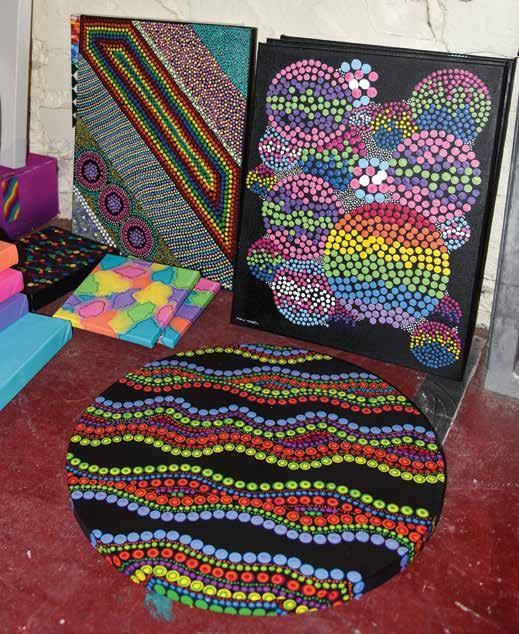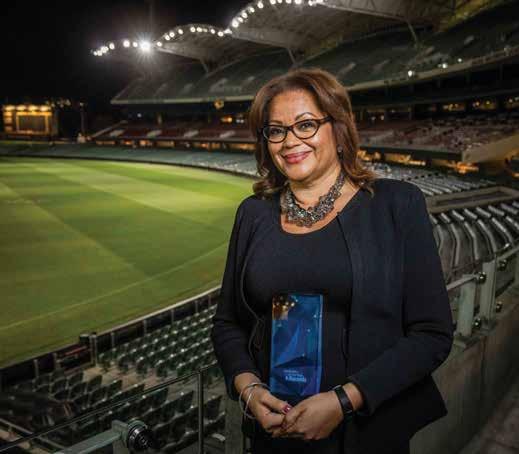
8 minute read
Q& A with South Australian of the Year Tanya Hosch
South Australian of the Year Tanya Hosch. Photo: Salty Dingo.
Tanya Hosch is the first Indigenous person and second woman to join the AFL at an executive level. Her leadership has made the game not only more inclusive for Aboriginal and Torres Strait people, but women and gender diverse players, too. Find out what makes Tanya tick in our Q&A with the South Australian of the Year.
Advertisement
How do you think we can all be better Australians in our everyday lives? That is a good question. The thing that I think would make a significant impact on us as a country and ensure better outcomes for Aboriginal Torres Strait Islander peoples would be for us to deal with the systemic and institutional racism that still exists. It would really help the country as a whole move on with more harmony, and also just have a practical outcome of ensuring that everyone has a better experience of life, fairness and justice, overall.
What do you think about changing the date of Australia Day? It’s something that’s been called for, for a very long time. I thought what was interesting this year, is the conversation went up a few notches. I think it’s a frustration that you have this conversation every year and it never sort of gets resolved. What was good this year, was that the people were sort of extending the conversation. I think there’s just so many opportunities that are positive from doing it.
It’s a step that’s needed to move forward together, right?
Yeah, absolutely. And you can see that from the rallies and marches that happened on the day, it’s not just Aboriginal Torres Strait Islander people going to those, it’s people from all walks of life, who really do want to ensure that the first peoples of the country and our history, is inclusive of all of the stories that create Australia’s story. Not just some of them. Why do you think that it’s okay for some Australians to see Aboriginal culture in a museum, but not on a footy field like we saw with the booing of Adam Goodes?
I think it becomes clear the more Adam spoke about his experience and his passion for addressing racism and talking very directly about those things, calling it out where he had experienced it in footy, the more you will have people push back.
I think it’s often the case that people will support you if you’re great at something, particularly sport, but then there’s always this interesting discourse about whether or not having that platform affords you the right to give a political view or a personal view about anything.
I think we’re seeing it more and more, not just in sport, but also in entertainment that people are wanting to use their platforms to talk about the things they care about. And I don’t think that’s going to go backwards. So, if that is confronting and challenging for people, I think that like a lot of things over time, people will become more familiar with it and hopefully respect their right to use the platform in the way they see fit.
What change have you been able to create at the AFL?
The change had been kicked off well before my time. You have to go back to people like Michael Long, where he was behind Australian rules football having the first racial vilification policy in a sport. He worked alongside other players like Michael McLean, Gilbert McAdam and Che Cockatoo-Collins to make sure the league understood that vilification on field was not okay.
I’m just trying to progress the steps and the path that I had already been laid. The playing group and what they experienced now, you know abuse and harassment on social media, that’s a new domain. At the end of the day, we’re an employer and players are at work and they deserve to be safe at work and they, and their families should not vilified just while they’re doing their job. There’s still a lot of work for us to do, it speaks to the fact that there’s still a lot of things structurally in place that don’t adequately address some of these issues and what we really need to continue to work on.
I am interested in your career before the AFL. Did you experience much racism in other roles?
Yeah, I did and still do, don’t expect that to change anytime soon. I’m in a really privileged position compared to a lot of people. So I think that I’m fortunate, but I certainly remember my early years in the workforce, from my first job, having some really overtly racist experiences and being very fearful about dealing with them, in many ways it was an extension from going to school.
I think by the time I got to the workforce, I probably didn’t really expect it to be very different and as it turns out it wasn’t. But I do think it’s important that we make sure that there are things in place that are rights and the policies to protect our rights are enforced and that people know that they do have options.
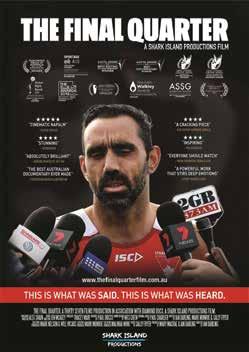
The Final Quarter film uses archival footage to share the racism endured by champion AFL player Adam Goodes on and off the field. Watch via thefinalquarterfilm.com.au I also know that people who have made reports have sometimes come out of that disappointed and not felt heard, so I can understand why people don’t trust those systems as well. So, you know, all the work that I think we do and, your organisation (SANTS) does is a really important part of helping educate the community and standing up for the rights of people, so that they do feel heard and hopefully are better protected is critically important.
What’s your take on racism and does it start in the school yard? I do think that young people are being educated better about these things. Certainly, the education system through the work of a lot of Indigenous Australians who fight to make sure the educational system actually taught the whole history of the country and the cultures that have always been here.
I’ve got a 13-year-old daughter and I know that she and her friends are very alert to when someone says or does the wrong thing I think some of it will be generational, but, I think ultimately it starts at home and everything we take in media, movies, sport, everything impacts our worldview.
In the past you’ve said, “I do what’s right, not what’s popular.” Out of what you’ve done right, what are you proud of? Seeing the Nicky Winmar statue come to life. He’s the first Indigenous AFL player statue ever. Because it is that iconic pose of him pointing to his stomach and his skin saying that he’s black and proud. I think the fact that it wasn’t a mark, or a handball pose as well, what it stands for represents more than just Nicky Winmar the player. I’m very proud of that. It was a really hard project to get up. I had no idea how hard it was to, work on a statue, but absolutely worth it.
I’m really proud that, you know, under my watch at the AFL, we’ve had the first ever Aboriginal appointment to the AFL tribunal.
I’m just proud that I’m in a position where I get to speak to decision makers at the highest level of Australian rules football, being the first ever Indigenous person appointed to the AFL executives to be able to use my voice and take that opportunity.
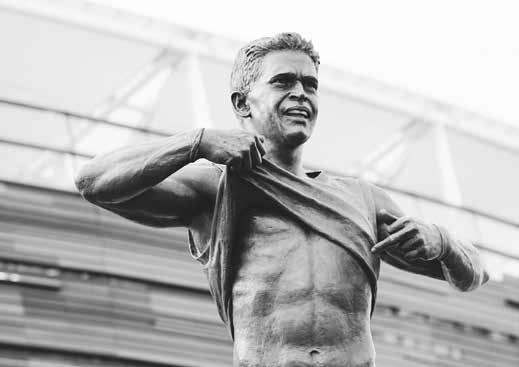
Mali Isabel is making her ar t empire
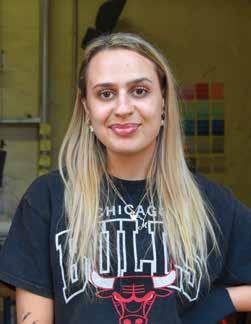
Meet Mali Isabel, an Arabana and Kokatha artist making a name for herself on Kaurna land. The 21-year old was a successful applicant of a year-long residency at Carclew – a multi-art form organsation cultivating artists early in their career.
Mali dabbles in ceramics and photography, but currently acrylic on canvas is her medium of choice and she isn’t afraid of using the whole rainbow. “I would say my style was very contemporary, but I feel like it’s also quite unique because many people wouldn’t even dare to use the colours that I do.”
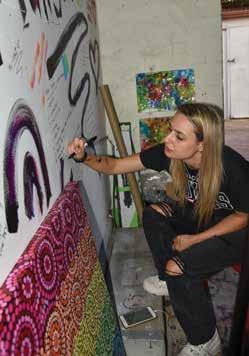
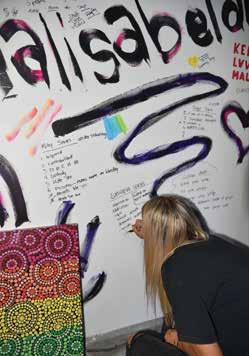
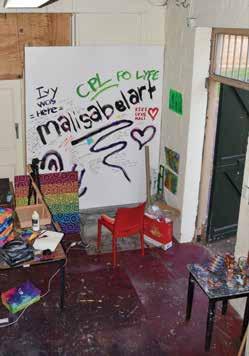
Mali uses one of her studio walls to brainstorm ideas that inspire her artworks – from mental health to Miley Cyrus.
“I base all of my art on equality, so during this time when I started doing art, same-sex marriage was just legalised in Australia,” she explains. “People would just keep it like neutral, basic tones or pastorals whereas I just go like neon and bright.”
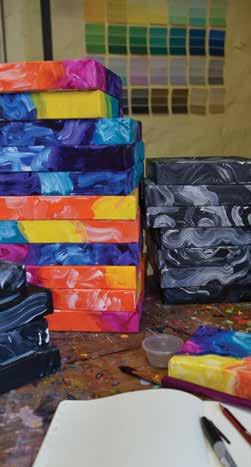
Part of Mali’s residency at Carclew includes support with developing her creative practice and opportunities to run her own workshops.
“Recently I did a six-panel mural with year five to eight students focusing on a Narungga dreaming time story. We had the kids design the mural, create the mural and then it was put up in the school. It was absolutely amazing.”
Mali is determined to let nothing hold her back from making a “massive name” for herself with plans to have exhibitions all over the world.
“I feel like being Indigenous and then being a woman, like there’s two things that are so against me in the world already, but I feel like nothing can stop me because if I want something I’m going to go out and make it happen regardless.”
Mali is currently building her website, but she regularly shares her work on Instagram and says you’re welcome to message her to commission an artwork.
“It’s as simple as throwing me a DM and then we discuss colours, size, check out my price and then people just wait until it’s ready.”
Follow Mali on Instagram: @malisabelart
